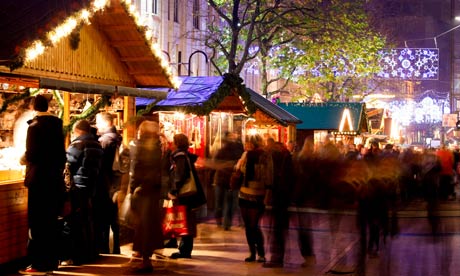Britain has been copying Teutonic Christmas traditions ever since Prince Albert came home from a holiday in Germany in 1841 with a Christmas tree in his luggage. But this year Anglo-German relations have reached a new high as towns up and down the country have sprouted German-themed markets – some more than one – in the run up to Christmas.Birmingham's Christmas market – full of authentic German Christmas goodies with a few local adjustments, says pioneer Kurt Stroscher. Photograph: Alamy
The first of these Christkindlmarkt, introduced to Birmingham's New Street more than a decade ago, has this year mushroomed to 180 stalls, making it the sixth biggest German Christmas market in the world – bigger, according to Birmingham city council, than those in Dresden, Berlin and Nuremberg.
Frankfurt's twin city Birmingham seemed a logical place to do it and he persuaded a gaggle of German stallholders to ship their stands across the Channel and up to the Midlands despite widespread scepticism that "die Briten" could be weaned off "fisch und chips" and on to "Krustenbraten und Sauerkraut" (crispy pork with stewed cabbage).The man to thank – or blame, depending on how you feel about the smell of bratwurst and glühwein as you go about your festive shopping – is Kurt Stroscher, who brought the Christkindlmarkt concept to these shores 13 years ago after being given the job of marketing his home city of Frankfurt abroad. "We were the pioneers," he said this week, as he tucked into vanilla cake in a log cabin plonked down like a tardis on New Street.
After racking his brains, Stroscher persuaded his bosses at the Frankfurt tourist board that the best way to promote the city to Brits was to get away from its image as a staid financial centre. Instead, he suggested, they should export an authentic German Christmas market of the kind that has been running in Frankfurt since 1393.
Frankfurt is allowed to sponsor the event in return for paying for all the policing, refuse collection and administration costs. It's worth it, he said. "Our research shows that between 2000 and 2010, there was a 30% increase in British visitors to Frankfurt's original Christmas market. And a lot of visitors decide to come when they visit German markets in the UK and want to see the real thing."It was only supposed to be a one-off, but Brummies got a taste for German Christmas treats and Stroscher realised the idea had legs. Now, Frankfurt's tourist office puts on four of the biggest German Christmas markets in the UK, in Edinburgh, Manchester and Leeds as well as Birmingham. "Last year, almost 3 million people visited this market," said Stroscher, "and it doesn't cost Birmingham a penny."
Stroscher's Birmingham extravaganza is now replicated across the UK. Cologne sponsors a market on London's South Bank, run by a German-run company that also operates festive markets in Glasgow, Canterbury and Peterborough. The French firm Geraud operates two in Liverpool and Cheltenham, and there are others everywhere from Brighton to Rochester. "It makes me proud to see what I started," said Stroscher.British people seemed to appreciate the simple pleasures of a German Christmas, he said. "At authentic German Christmas markets there is no place for brash US-style commercialism with garish decorations and little regard for the real spirit of Christmas steeped in Christian custom and history. In Germany, Advent and Christmas are a time for peace and quiet reflection, for Gemütlichkeit – conviviality – and the pursuit of age-old customs with family and friends."
Lincoln, it should be noted, may quibble with Stroscher's claims to be a pioneer; a German-style market has run in the town every year since 1982, when a group of Lincoln city councillors visited Neustadt an der Weinstrasse and were so impressed by its Christkindlmarkt that they decided to put on their own – which will not run this year because of the snow.
Despite this , certain aspects of the market have been adapted for British tastes. "We don't have beer stalls, or wine stalls in Frankfurt – just stalls selling glühwein and other hot drinks," said Stroscher. "But Birmingham council specifically requested them, and they are by far the most popular stands here."Anyone who has visited a German or Austrian Christmas market will recognise the sights and smells in the British copycats. There are stalls selling candles, wooden decorations, stamps and traditional toys, as well as booze and carb-loaded treats.
For Stroscher, authenticity has always been paramount. "I didn't want to do a Disney version of a Christkindlmarkt. I wanted it to feel real, which is why only German stallholders are allowed to set up shop in our UK markets," he said.
via guardian.co.uk

No comments:
Post a Comment